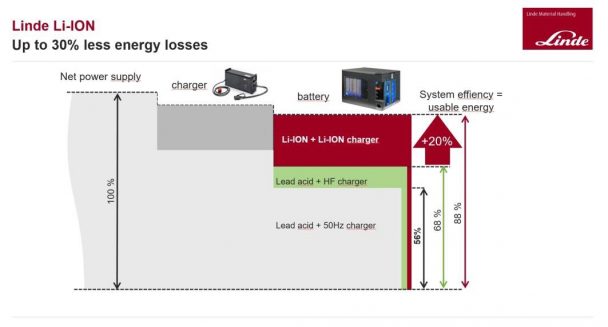We understand that when compared to traditional lead-acid batteries, lithium-ion batteries in industrial trucks offer numerous advantages. Over the years, we've received many questions about our lithium-ion battery systems. To address these inquiries, we've created a three-part series to explain this technology in detail. Enjoy part one!
-
Can I treat lithium-ion batteries like lead-acid batteries? No, lithium-ion technology differs significantly from traditional lead-acid technology. Lithium-ion batteries offer notable efficiency advantages, such as a much longer service life, highly efficient charging, and reduced maintenance costs, but they require special considerations for storage and transportation.
-
How many charging cycles is a lithium-ion battery designed to last? Our Li-ION batteries guarantee at least 2,500 charging cycles (a complete charge and discharge counts as one cycle). Up to this point, the battery retains about 75% of its original capacity for warehouse trucks (24V) and 80% for electric forklifts, reach trucks, and VNA trucks (48V and 90V products). Many lithium-ion batteries can even be used for a second truck life.
-
What effect do opportunity charges have? Opportunity charging does not negatively affect the overall service life of lithium-ion batteries, unlike traditional batteries. Lithium-ion batteries are not subject to the "memory effect," meaning full energy capacity is always available, regardless of the regular charge and discharge range. These batteries perform best within a 20-90% State of Charge (SOC).
-
What are the key benefits of Li-ION technology?
- Higher efficiency: Li-ION batteries have up to 20% higher electrical efficiency compared to lead-acid batteries, resulting in less energy loss and heat development, leading to lower energy costs.
- Intermediate charging: Allows charging at any time (e.g.during lunch breaks), providing higher flexibility and ensuring high truck uptime and multi-shift availability.
- Fast charging: Li-ION batteries charge faster than lead-acid batteries, enabling economic use of charging times during regular breaks and reducing charging installation costs and space.
- No battery change necessary: Most 2-shift applications do not require battery changes, saving costs and time.
- Emission-free: Li-ION batteries do not emit hazardous gases or acids and do not contain toxic substances like Cd, Pb, or Hg.
- Maintenance-free: No daily maintenance like water refilling or battery cleaning is needed, and no regular battery control or add-ons are required.

-
What advantages do lithium-ion batteries bring to daily operations? Lithium-ion batteries offer high energy density, fast charging, long service life, low self-discharge rate, and the ability to discharge down to approximately 5% SOC without affecting performance. They can be fully charged in less than 90 minutes, allowing for quick interim charging and eliminating the need for battery changes. Maintenance costs are reduced, and there is no need for battery rooms, resulting in:
- No need for multiple batteries
- No battery changes
- No daily maintenance
- High truck availability with less downtime
- Efficient use of breaks for charging
- Energy savings and a longer battery service life
- Residual battery value after 2,500 cycles
-
What effect does the weight of a Li-ION battery have compared to lead-acid in terms of counterweight? Additional weight is added to Li-ION batteries to maintain their residual capacities.
-
Can I charge lithium-ion batteries with my normal battery charger? No, only the corresponding Linde Li-ION charger is suitable, as it communicates with the battery via a CAN-Bus interface.
-
Can we have on-board chargers with Li-ION batteries? Some 24V warehouse truck models have on-board charging available with Li-ION batteries.
-
Could we have a mains current draw charger guide? The battery and charger data sheets provide the ‘Max AC current’ figure and the primary peak power draw for each charger type.
-
What are the charging times? Refer to the datasheets for 24V, 48V, and 90V batteries.
-
What are the minimum 20% to 100% charging times? The battery and charger data sheets show the charging times from 95% discharged to fully charged for each battery and charger combination. Li-ION chargers maintain a constant rate up to a certain SOC, with the last 10-15% SOC taking longer to charge to avoid overcharging.
-
How much current does the Li-ION charger draw compared to a HF charger? Li-ION battery chargers generally have a higher output and thus require a higher input current. The CAN-Bus communication allows the most powerful chargers to charge batteries with varying energy content efficiently.

-
Can Li-ION batteries be charged via either 3-phase or single-phase supply chargers?
- 24V batteries (warehouse products) have one single-phase charger.
- 48V/90V batteries (counterbalance and reach) have only 3-phase chargers.
-
Do I need to make any changes to my electrical supply to accommodate the chargers? We will work with you to check your current system's capacity, considering factors such as current energy consumption, infrastructural conditions, and possible effects on peak power demand.
-
Are there any differences between a Lithium-compliant charger and a standard charger? The main differences are the higher current draw and the different circuit breaker and connector types required.
-
How much energy will this technology need? An energy survey is necessary to determine if your site can accommodate Li-ION batteries. Li-ION batteries typically do not require changing, unlike lead-acid batteries, so we need to ensure your trucks and opportunity charging periods meet your application needs.
For further clarification or to discuss upgrading to Li-ION battery technology, please contact us by clicking here.


